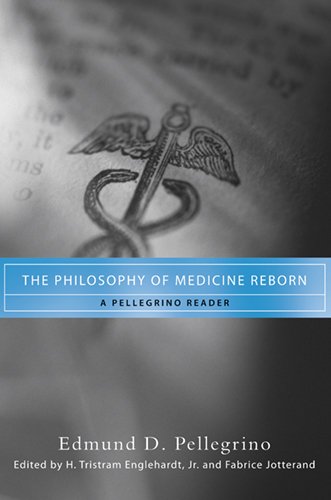Edmund D. Pellegrino has played a central role in shaping the fields of bioethics and the philosophy of medicine. His writings encompass original explorations of the healing relationship, the need to place humanism in the medical curriculum, the nature of the patient’s good, and the importance of a virtue-based normative ethics for health care.
In this anthology, H. Tristram Engelhardt, Jr., and Fabrice Jotterand have created a rich presentation of Pellegrino’s thought and its development. Pellegrino’s work has been dedicated to showing that bioethics must be understood in the context of medical humanities, and that medical humanities, in turn, must be understood in the context of the philosophy of medicine. Arguing that bioethics should not be restricted to topics such as abortion, third-party-assisted reproduction, physician-assisted suicide, or cloning, Pellegrino has instead stressed that such issues are shaped by foundational views regarding the nature of the physician-patient relationship and the goals of medicine, which are the proper focus of the philosophy of medicine.
Â
This volume includes a preface (“Apologiaâ€) by Dr. Pellegrino and a comprehensive Introduction by the editors. Of interest to medical ethicists as well as students, scholars, and physicians, The Philosophy of Medicine Reborn offers fascinating insights into the emergence of a field and the work of one of its pioneers.Â
Â
“After a long period of dormancy, philosophy of medicine has blossomed with new life. The single most important physician-philosopher in that rebirth has been Edmund Pellegrino. His contributions to virtue theory, the concept of beneficence, the dispute over the internal and external sources of a morality for medicine, and the role of the Hippocratic tradition are all critical. The essays collected in this volume have changed the history of the philosophy of medicine. He shows that philosophy of medicine can be done with both passion and compassion.†—Robert M. Veatch, Kennedy Institute of Ethics, Georgetown University
Â
“Edmund Pellegrino's words have helped medical students, faculty, scholars and patients address the challenges they encounter in medicine and medical practice. His personal support has also been critical for many of us in developing programs in medical ethics and philosophy of medicine in our universities. Dr. Pellegrino combines the wisdom of a great physician with those of a great philosopher to produce a body of writing that will continue to inspire us all. This volume contains some of his best and most influential work.†—Loretta Kopelman, The Brody School of Medicine, East Carolina University
Â
“Edmund Pellegrino has been a leading light in the philosophy of medicine for a generation. He was instrumental in the birth of bioethics, founded one of the leading journals, and provided able leadership in organizing early activities of the profession. He has served as department chairman, dean, and university president. Most recently, he chairs the President’s Council on Bioethics. In all this, first and foremost, he has been a physician. Those who are ill and suffering make a claim upon him. To respond to this claim, Pellegrino creatively brings together the worlds of science and of the humanities. For him, that is what medicine is about, making it the most scientific of the humanities and the most humane of the sciences. Fortunately for us, Pellegrino brings these worlds together in thought, as well as in practice. In this selection from his writings, Engelhardt and Jotterand have captured the heart of Pellegrino’s project, both in depth and breadth, so we can also hear that claim of the ill and so we can see what worlds must come together if we are to respond in the appropriate way.†—George Khushf, University of South Carolina
Â
“Pellegrino’s work is both a treasure and important for understanding bioethics. His work in philosophy of medicine addresses the crucial questions that are so important to understanding the practice of medicine and the ethics of health care.†—Kevin Wildes, President, Loyola University
Â
Â


